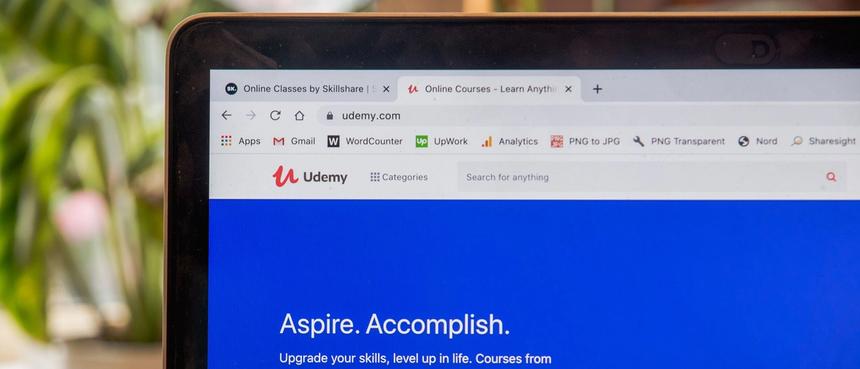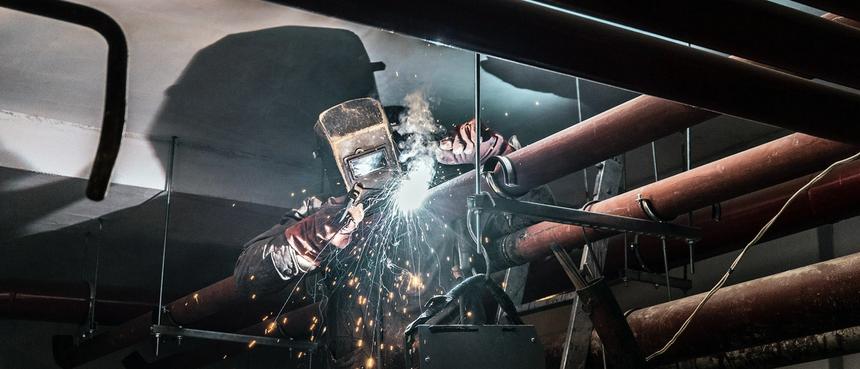Education/00
10.08.2021
Bring up education in almost any situation and I’d bet most people’s first thought is college. That's no surprise as college, or undergraduate programs, have not only been gaining in popularity over the last century but in a lot of ways, the university has become the standard for anyone hoping for a successful career or class crossing ambitions.
Post World War II, education beyond high school was foisted upon the baby boomer generation as the only way to make something of yourself. More for men in the early days, but even young women were encouraged to get some formal training after high school. For some, college was a means of opportunity to move beyond or at least secure their standing in the middle-class. For others, pressure from parents was a major influence. And yet some were motivated by internal forces to learn more about their interests and the world at large. Over the course of a few decades, post-secondary education just became the norm, so much in fact that “Between 1947 and 1995 the number of high school graduates entering college (including community college) rose from 2,338,2261 to 14,261, 8002—a rate of growth three times faster than that of the population“.
High School
By the time I entered high school in 2001, preparing for and intending to go to college wasn’t just the norm, it was the expectation. As a freshman in high school (for some even earlier), you begin to prep for this eventuality by taking courses and participating in extracurriculars specifically chosen to look good on your transcripts for university. I didn’t think much about it at the time because, as I said, it was just the norm. While I participated in this ritual, my ultimate outcome was not quite what I (or my parents, God bless them) anticipated.

I struggled through high school. Not for lack of intelligence or academic capabilities, but because distractions at that time were many, and school simply couldn’t keep my attention. Large classrooms with kids of varying capabilities, teachers doing their best to cater to all, and a system designed to prepare EVERYONE for college left me bored, under-challenged, and frustrated with the amount of homework necessary to get good grades. I couldn’t rationalize spending 8 hours a day in classes that absolutely bored me to tears and then having to go home and spend another 2-3 hours doing exercises designed to drive points home that I picked up on and understood in the first 20 minutes of class.
That last paragraph may make me seem like some pompous ass that thinks he is the smartest kid in the room, but that isn’t the intent or the reality. I thrive around people much smarter than myself, and while I do consider myself decently intelligent, in no way am I a genius or know-it-all. I simply pick up things with relative ease. I can grasp complex concepts on the surface without much depth of explanation. It is this actual trait that has led me successfully down the path that I am on to this day, but we'll get into that later. I am simply trying to be straightforward and honest about my own experience because I am sure that there are others that feel similarly or had similar experiences.
On top of the issues I had with the process of high school and the homework, the much larger issue was distraction... made worse by boredom. Think about it, as teenagers the world is just beginning to emerge. We get more freedom of travel, friendships, relationships, activities, and responsibilities. My world had opened up so enormously, that once I got a driver’s license, it’s no surprise that I struggled to maintain focus once the school bell rang.

I grew up 30 minutes due east of Seattle Washington in a sleepy mountain town called North Bend. It’s the actual town where the cult favorite Twin Peaks television show was based and filmed. We had the vibrancy of city life on one side and the unlimited adventures provided by the Cascade Mountains on the other side. My natural interests drove me to the woods, mountains, rivers, and streams along with the local skatepark, and of course Girls. My friends and I spent our summers swimming, hiking, biking, and skating while fall and winters were spent almost entirely on the local mountain, snowboarding every single day of the season, from open until twilight on holidays and weekends. Schoolwork after class? I don’t think so... not with all the other things we could get into.
I quickly became disenchanted with school altogether. It just didn’t work for me. Everything was too slow, and I felt like I was living too fast to put on the brakes and participate. I went to class, took the tests, did the exercises and whatever else was required of me between 8 am and 3:30 pm, but once that bell rang, it was my time. As you can probably guess, this didn’t bode well for my grades, and by the time my senior year rolled around, I was failing. Failing so bad, that 2 weeks into my senior year, I dropped out.
The Dropout
I think it hit my parents pretty hard, but I actually believe they understood it. I was 17, so I needed my parent's authorization to drop out and they granted it to me on one circumstance. I had to go, that day, to the local community college and get my GED. So I immediately left school, drove to Bellevue, registered for and took my GED exam on the same day. I passed with flying colors and while there, I enrolled for the upcoming spring semester in a full schedule of college classes. Because that’s what you do after high school right? Go to college. Just because I didn’t graduate high school didn’t mean that I wasn't going to college. That is the mentality that was ingrained in me. Plus, with what I had heard about college, the challenge, and the pace, I was actually excited.
I spent the next three months working during the day while my friends were in school. Connecting with them after work as if nothing had changed. By the time winter rolled around and ski season was in full bloom, it seemed like everything had worked itself out. Eager to start college in January, a full semester before all my classmates, I felt like I came out ahead of the game. I had beaten the system. Unfortunately, that feeling faded quickly after a week into my first semester of college.

College...
College ended up being a huge disappointment. It wasn’t all that different from high school. The same slow pace, even larger classrooms, and 3 times the amount of homework. I was crushed. Demolished. While I did find the course material more challenging, the whole system felt all too similar and by the end of my first semester, I was bored again. I didn’t understand what all the hype was about. I certainly wasn’t enjoying myself and didn’t see any upside to what I was doing. After finishing the spring semester, I did enroll in fall courses, but I think I showed up to maybe 2 or 3 weeks of classes before giving up entirely. I spent my time focusing on work and all of my other interests, which at that time were many.
Over the next 5-6 years I had 36 jobs and enrolled in 3 or 4 different colleges, thinking that maybe one would ultimately satisfy me, with no luck. I bounced around from job to job firmly discovering a lot of what I didn’t want to do, while at the same time honing several different crafts that I still use to this day. I taught myself several instruments and how to record and compose music, on what most would consider a very high level. I made a ton of connections, learned how to sell, cook, bartend, and a whole host of other valuable skills before ultimately moving to Charlotte North Carolina after being a vagabond for over half a decade.
Go At Your Own Pace
By this time, it was 2010 and I discovered the most amazing thing in the world. Go-at-your-own-pace-education. At the time it was Lynda.com. An incredible resource in my early days, as it was free with my student login from my last enrollment in a 4-year university. I found a brainless job that allowed me to focus on education with my mind, while my body was left to work autonomously on the task at hand. I bought a decent pair of headphones and a MacBook, and self-educated every single day, 8-10 hours a day for the next 7 years. I went through almost 100 Lynda.com courses on a truly wide range of subject matter. Design, business, photography, computer programming, writing, statistics, accounting, management, you name it. I loved learning; I just didn’t know it.
I truly believe it was this discovery of self-education and my propensity towards it that allowed me to progress at that company over the course of nearly 10 years and at the same time start several of my own businesses, the most recent of which was acquired by a larger company 1 year after I started it. I started out as a shipping coordinator in a factory in 2011 and climbed my way up to a director role and entrepreneur by the time 2020 rolled around all due to self-education and work ethic. In that time span, I discovered several other means of acquiring knowledge that Lynda.com didn’t cover (plus my free subscription ended after the university shut down my student email, that was a sad day). YouTube was a boon for me. I actually discovered the validity of YouTube as a learning tool several years before I stopped using Lynda.com but I really dove in after that free subscription ended.

My initial experience with YouTube as a resource for knowledge came when my wife and I bought a beater of a house for our first home, and I set out to completely remodel the whole thing. Like... down to the studs. With no prior construction or carpentry knowledge of any kind. We made a rough plan and budget, but it was largely up to me to figure out how we would turn this discarded home into a jewel we would cherish. YT was my go-to for everything. How do you repair damaged studs? YT had the answer. How do you fix water damage to the subfloor? YT had the answer. How do you install hardwood floors? You guessed it…YT had an answer for everything.
We bought that house in March and got married on June 15 of the same year. I was putting the finishing touches on the trim work the morning of our wedding and by the time we returned from our honeymoon, it was ready to move in. I credit a lot of what we accomplished there to help from some friends and family that were able to share their knowledge and sweat, but a lot of what became our home was directly learned from go-at-your-own-pace learning. I loved it.

There are countless resources for self-education now. I loved Masterclass, though I think it is more focused on subject theory from world-renowned professionals and their crafts. However, today my main go-tos are Udemy and Youtube. I built this website from the knowledge I picked up on both of these platforms. I taught myself marketing and data analytics from both of these platforms. I parleyed that knowledge into a better salary and more responsibility at the company I was working for.
Platforms that offer students the ability to dive into any subject, manage their own time, and generate real results as quickly as they desire should be the norm. Not necessarily structured, institutionalized programs, designed by who knows who professional educators.
Don’t get me wrong, not everyone works the way that I do and not everyone has the organizational skills to self-teach. It truly is a gift that I am, and always will be, eternally grateful for. But, to point every high school student toward college as the norm or primary option for post-primary education, is just wrong for a number of reasons.
First, is the stigma it creates for those that can’t afford college or aren’t equipped to learn in that manner. The price of in-state tuition for a 4-year university has increased by over 460% in the last 50 years, and that’s just the tuition. In 2021, the average cost for a student to attend an in-state 4-year university nationwide was $25,362…per year. That’s over $100,000 in education expenses over 4 years and for most means a substantial amount of debt upon graduation. YouTube is free. Udemy courses range from $10 to $100 or so and courses regularly go on sale for low double digits. Even making minimum wage (in my state at least) you could expect to earn close to $20000/year instead of taking on debt. While at the same time, build some work history and use your free time to learn some new skills using any self-education platform. In my honest opinion, a lot of people would be better off taking this alternate and obscure path. But, it's not for everybody...

Doctors, Lawyers, & Teachers
Now, this doesn’t apply to aspiring doctors, lawyers, teachers, business executives, and many other positions that require a degree. Like it or not, if you are in that camp, you need that piece of paper from a university. I don’t agree with that in all circumstances, but I most certainly want the doctor performing lower lumbar surgery on me to have graduated from an accredited medical school and done his/her residency. I'm not that delusional! But I think too many careers require a piece of paper that isn’t worth the paper used to print it. In a lot of cases, it tells you nothing about the person. Not nearly as much as experience in a relevant field will, or professional accomplishments will, or a solid portfolio of demonstrable works will. These things become much more important for a hiring manager's confidence, should a degree not be a requirement.
Second, not everyone is cut out for college (I’m in this boat). College is designed to work for a handful of personas, and I would bet that even half of those it’s designed for, struggle to get through it. Some people are just wired to learn and think differently. Think of how many of the world’s millionaires, and billionaires didn’t finish college. Look it up, you may be surprised…or maybe you won’t be. In particular, free thinkers and creatives tend to struggle in structured learning environments because the course plans and methods don’t work for them. I suspect that all of them could struggle through it but I don’t think they would be any better off for it.

Don't Forget About the Trades
Third, there are those that would be far better served by trade education. On-the-job training in a field that interests them and speaks to their natural proficiencies. Trade schools were seen as important in the middle of the last century because we needed (and still need) electricians, builders, welders, fabricators, machinists, mechanics, lumberjacks, machine operators and so much more. These are highly important trades, as for the most part, the work is necessary and can’t be outsourced overseas. A lot of these positions pay far greater salaries than any fast-food restaurant or grocery store, and in a lot of circumstances, these people truly love what they do.
Not pushing kids that show propensity in the world of what I call haptic work or hands-on work, is a huge miss for our education system. I have seen some truly astounding crafts people’s creations in my time and it would be a shame and a major detriment to our society if these trades fell by the wayside. In fact, we quite literally can’t afford to not have these people in our day-to-day lives. All cars need repair, all buildings need building, all wires need connecting and all water needs plumbing. It’s just the nature of civilization.
The whole point here is that while I am not opposed to higher education the current mainstream education system is broken. Well, formal education systems anyway. There is so much more that can be garnered from society and people if a piece of paper isn't the determining factor of worth. All kinds of people, regardless of educational paths, are capable of providing highly valuable contributions to corporations, communities, and humanity at large. Everyone should have a shot or two to prove what they are worth in a wider variety of fields with or without college degrees. Remember that just because someone learns differently than college institutions allow, doesn’t actually mean anything. Just ask Bill Gates, or Mark Zuckerberg, or Jay-Z, or...well, you get the idea.